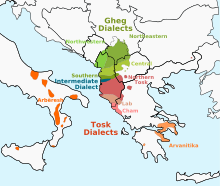Gheg Albanian
| Gheg | |
|---|---|
| Region | Albania, Kosovo, Macedonia, Montenegro, Serbia |
|
Native speakers
|
3.45 million to 3.47 (2000 – 2001 censuses) |
|
Indo-European
|
|
| Language codes | |
| ISO 639-3 | |
| Glottolog | gheg1238 |
| Linguasphere | 55-AAA-aaa to 55-AAA-aag |

A map showing Gheg speakers in green
|
|
Gheg (or Geg) (Albanian: Gegë) is one of the two major varieties of Albanian. The other is Tosk on which Standard Albanian is based. The geographic dividing line between the two varieties is the Shkumbin River, which winds its way through central Albania.
Gheg is spoken in Northern Albania, Kosovo, northwestern Republic of Macedonia, southeastern Montenegro and southern Serbia, by the ethnographic group known as Ghegs.
Gheg does not have any official status as a written language in any country. Publications in Kosovo and Macedonia are in Standard Albanian, which is based on Tosk. However, some authors continue to write in Gheg.
The Ghegs speak Gheg, one of the two main Albanian dialects. Before World War II, there was no official attempt at legislating a unified Albanian literary language; both literary Gheg and literary Tosk was used. The communist regime imposed a Tosk-based unified standard with basis in the Korçë speech, in all of Albania. The same standard was adopted by the Albanians in Yugoslavia, who had until then used the Gheg standard, in a process that began in 1968, with culmination in 1972 when the first unified Albanian orthographic handbook and dictionary was agreed upon in 1972.
The Albanian communist regime based Standard Albanian mostly on Tosk. That practice has been criticized, notably by Arshi Pipa, who claimed that this decision deprived Albanian of its richness at the expense of the Ghegs, and he referred to the literary Albanian language as a "monstrosity" produced by the Tosk communist leadership that conquered anti-communist northern Albania militarily and imposed its Tosk Albanian dialect on the Ghegs.
Although Albanian writers in former Yugoslavia were almost all Ghegs, they chose to write in Tosk for political reasons. The change of literary language has significant political and cultural consequences because the Albanian language is the main criterion for self-identification of the Albanians.
...
Wikipedia
